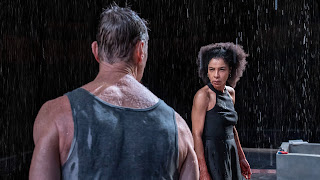So you'd think by the time the pair settled in Corinth, now with two sons (Eiden-River Coleman & Oscar Coleman, alternating with Heath Gee-Burrowes, Ben Connor, Kobe Champion-Norville and Elliott O'Shea,) Jason would know not to get on her bad side.
Instead, he accepts King Creon's offer to marry his daughter and become heir to the Corinthian throne, and Medea has refused to take this betrayal lying down: By the time we join the action her protests have angered the king, who arrives to inform her both she and her sons are exiled from the city immediately. Managing to get a few hours' grace, she meets with Creon, Jason and other characters, ostensibly making plans to survive her banishment, making nice with her enemies and discussing the events that have led her here. In reality, she's planning and putting into place an elaborate and grisly revenge plot, with a shockingly personal climax.
The horror in Okonedo's performance - and the joy in watching it - is in how subtly she lets things escalate. First arriving on stage in shades and throwing a tantrum, she could almost be a soap opera drama queen, hard to take seriously. Add the different levels of disrespect and harm she's been subjected to and by the end it seems inevitable that she can think and do the unthinkable. What's chilling here isn't a mounting insanity but the steps by which her actions seem almost sane. It's left to Marion Bailey's Nurse and the Chorus to express just how dark things are getting.
The in-the-round venue has inspired Cooke to give the Chorus a particular twist: He's planted Penny Layden, Jo McInnes and Amy Trigg in the audience, and until the last couple of scenes that's where they stay to deliver their lines. It means Okonedo treats the entire audience as the Chorus of Corinthian Women who've come to lend their support, but find their sympathy can only extend so far. Meanwhile Daniels spends much of his time walking around the stage in slo-mo, changing the jackets that signify which character he's talking on next. He brings some tension-breaking comedy with his surprisingly camp take on Athenian King Aegeus, although I'm not sure I'm entirely comfortable with the big gag being the implication that his failure to sire children is because he's been sticking it in the wrong place.
It's rare a Greek tragedy holds my attention quite as consistently as this one; as well as the performances I think a lot of this is down to how Jeffers' text and Cooke's production build the grimly inevitable logic of what Medea does, beginning with her fear that exile into the wilderness will be a fate worse than death for both her and her sons. Aegeus' speech about the importance of immortality through children then introduces the way she begins to see it as a revenge plot as well. Meanwhile the casting of Medea and her children as the only non-white characters gives a different context to the descriptions of her rival's "pale face and golden hair," and the suggestion of why Jason might be replacing her and their children; and it brings out a patronising orientalism to his claim that she should be grateful he rescued her from the barbarian lands (modern-day Georgia) so she could see Western sophistication.
So there's little to find fault with here: I imagine most audience members come into Medea with at least some idea of the final act the character's notorious for, and for them Cooke's production offers a forensic take on the grim logic leading up to it. For anyone who doesn't, they must surely see it building to a horrible inevitability. There's both emotional heft and interesting takes on the story here to keep both newcomers and jaded old hands looking at it with fresh eyes.
Medea by Euripides in a version by Robinson Jeffers is booking until the 22nd of April at @sohoplace Theatre.
Running time: 1 hour 35 minutes straight through.
Photo credit: Manuel Harlan / Johan Persson.






No comments:
Post a Comment